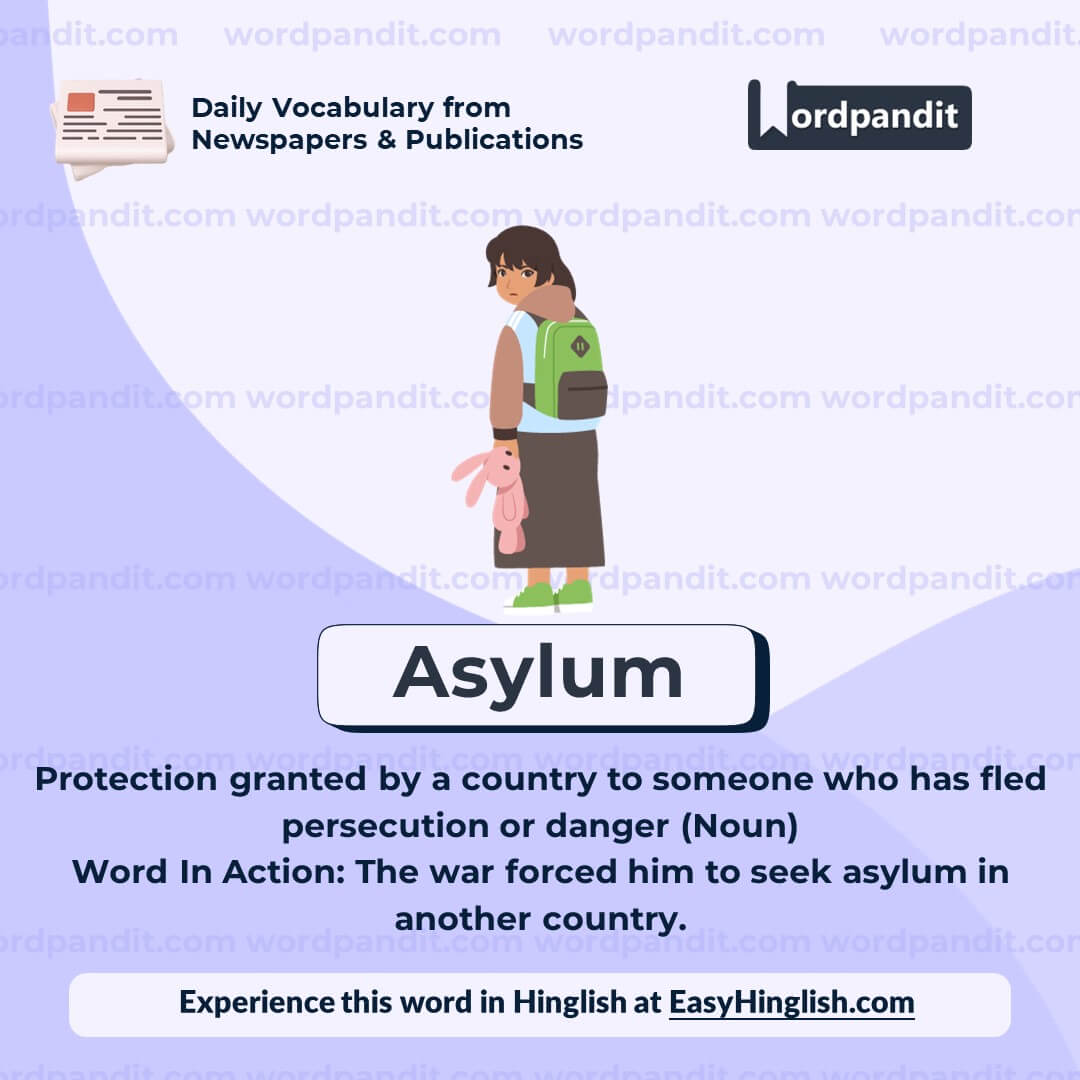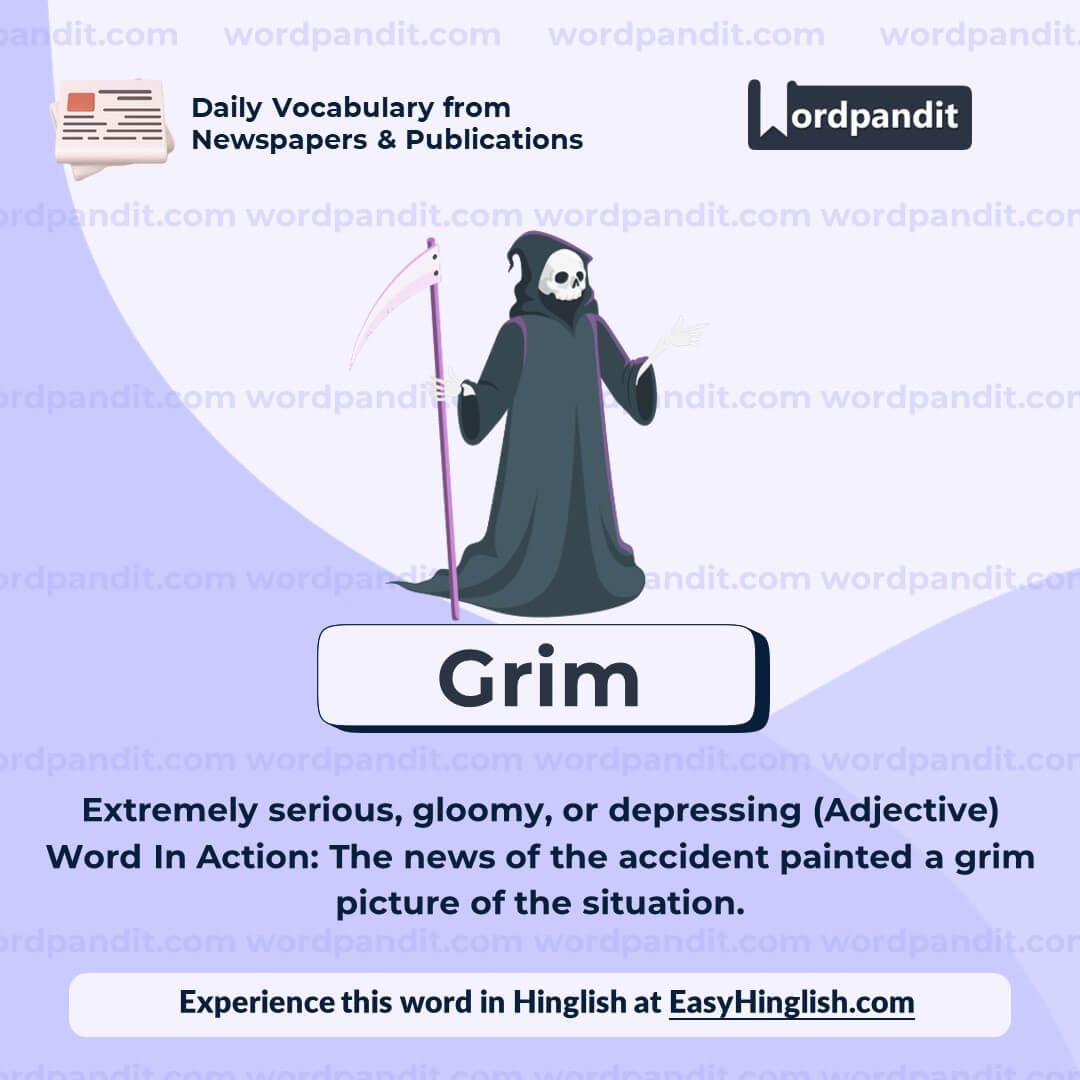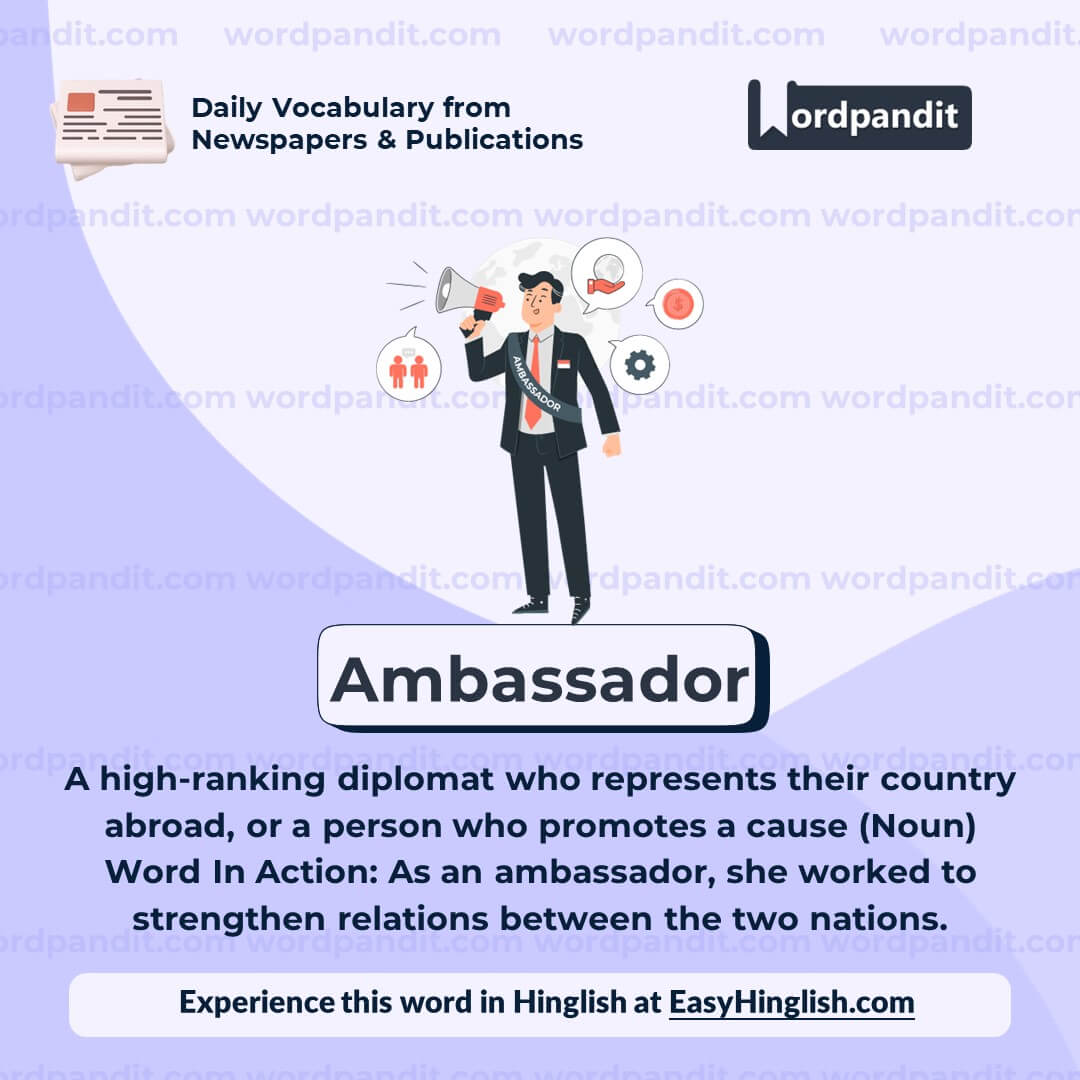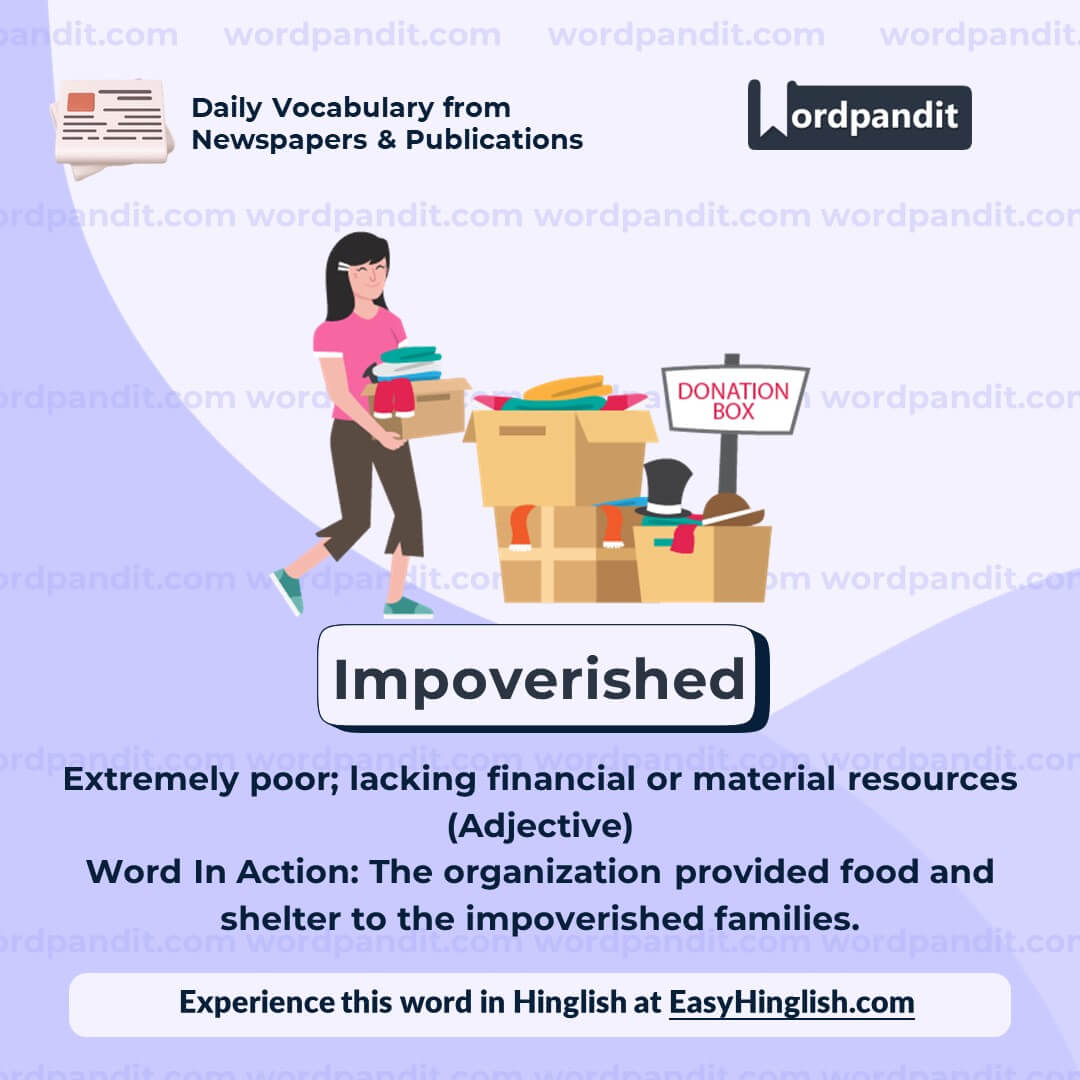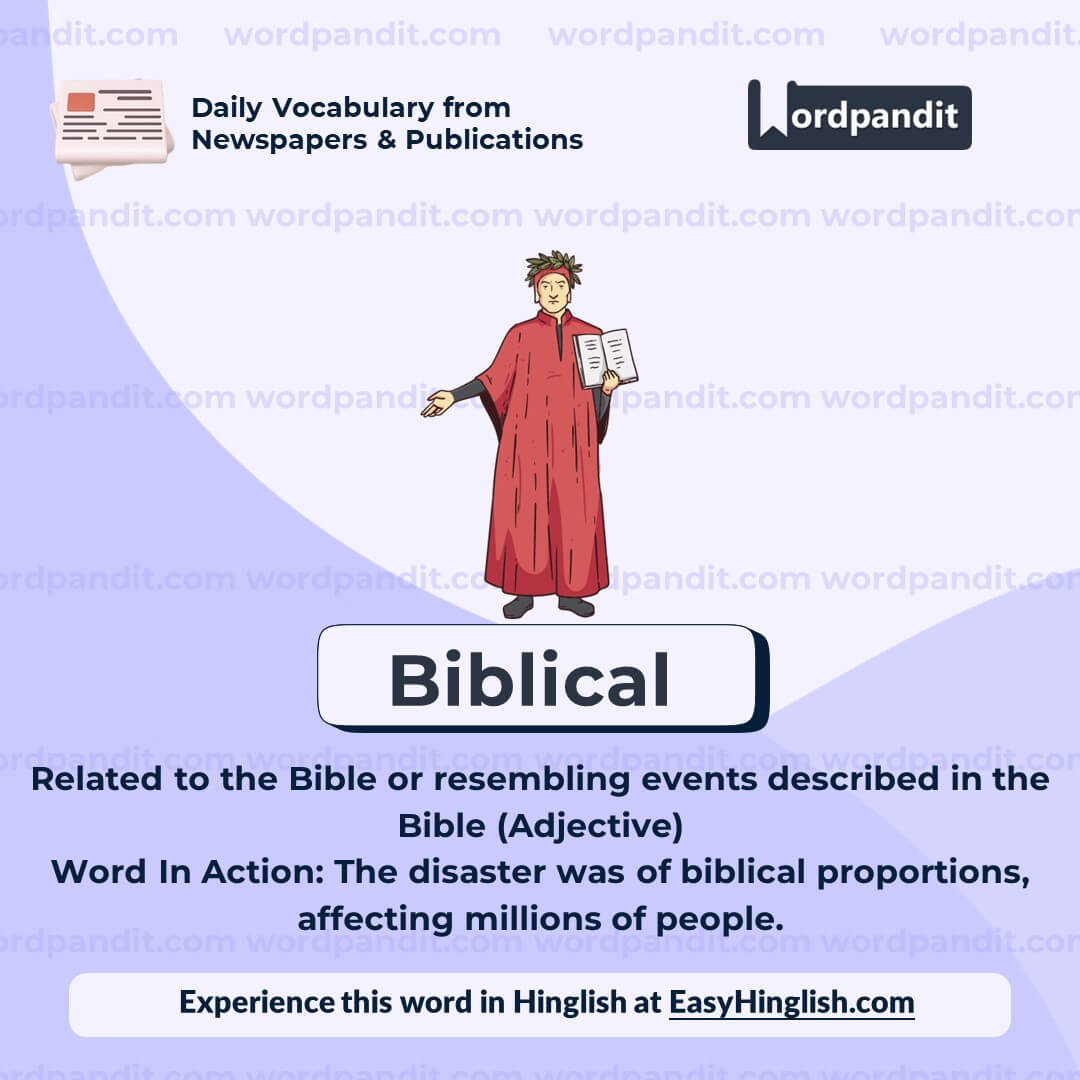Daily Vocabulary from International Newspapers and Publications
Expand Your Vocabulary with Wordpandit’s Global Vocabulary Hub
At Wordpandit, we are committed to helping you develop a truly global vocabulary by drawing from some of the most respected international publications. This section is designed to keep you ahead of the curve by introducing you to words that define global conversations and trends.
The Power of Global Sources
To help you think and communicate on a global scale, we curate vocabulary from renowned international sources, such as:
- The New York Times
- The Washington Post
- BBC
- The Guardian
- The Economist
- Scientific American
- Psychology Today
- And many more...
Stay Global, Stay Competitive
Our daily updates from international publications ensure you are consistently exposed to new words that reflect global news and developments, making sure your vocabulary is not only current but also globally relevant.
Enhance Your Global Perspective
Whether you’re preparing for international exams, aiming to excel in global business communication, or want to enhance your language skills for personal growth, Wordpandit offers the resources you need to thrive in a global context.
Effective Learning, Global Reach
Our learning methodology combines global examples, memory aids, and interactive activities, allowing you to internalize new words effectively and apply them in real-world scenarios.
Begin Your Global Vocabulary Journey Now!
Why Choose Wordpandit?
Practical Learning: Focus on words you'll actually encounter in real-world reading, enhancing your comprehension and communication skills.
Diverse Content: From current affairs to scientific breakthroughs, our varied sources expose you to vocabulary across multiple domains.
Effortless Integration: Make Wordpandit a part of your daily routine. Just a few minutes each day can significantly boost your lexicon over time.
Your Path to Vocabulary Mastery
- Visit our Daily Vocabulary section regularly
- Explore new words and their usage in context
- Practice incorporating these words into your own writing and speech
- Track your progress as your vocabulary expands
Start Your Journey Today
Embark on your vocabulary enhancement journey with Wordpandit. By consistently engaging with our daily posts, you'll build a robust vocabulary that serves you well in academic, professional, and personal contexts.
Remember, a word a day keeps linguistic limitations at bay. Make Wordpandit your daily companion in the quest for vocabulary excellence!
WORD-1: Asylum
Context:
"The apparent movement comes after a turbulent week in German politics, which focused on migration and asylum, with critics accusing the CDU/CSU of breaking the political ‘firewall’ by passing a non-binding motion with the far-right Alternative für Deutschland." - The Guardian
Explanatory Paragraph:
The word "asylum" refers to protection or shelter provided to individuals who are fleeing persecution, danger, or hardship in their home countries. It is commonly associated with political refugees who seek safety in foreign nations due to threats to their lives or freedoms. The term can also refer to a place of refuge or sanctuary in a broader sense, such as institutions that care for vulnerable individuals.
Meaning: Protection granted by a country to someone who has fled persecution or danger (Noun)
Pronunciation: uh-SY-luhm
Difficulty Level: ⭐⭐⭐ Intermediate
Etymology: Originates from the Greek word "asylon," meaning "sanctuary" or "refuge," which later passed into Latin and Old French before entering English in the late Middle Ages.
Synonyms & Antonyms:
Synonyms: Refuge, sanctuary, shelter, haven, protection
Antonyms: Danger, exposure, peril, risk
Usage Examples:
- Thousands of refugees sought asylum in neighboring countries after the war broke out.
- The activist was granted political asylum in France after facing persecution in his homeland.
- The monastery served as an asylum for those fleeing from religious oppression.
- Many asylum-seekers face lengthy legal battles before their applications are approved.
Cultural Reference:
"The right to seek asylum is recognized under international law, most notably in the 1951 Refugee Convention, which outlines the rights of refugees and the responsibilities of nations in providing protection." - UNHCR
Think About It:
How do different countries balance national security concerns with their moral and legal responsibilities to provide asylum?
Quick Activity:
Research a historical figure who was granted asylum in another country and summarize their story in a few sentences.
Memory Tip:
Think of "asylum" as a "safe island" (similar pronunciation) where people go to escape danger.
Real-World Application:
The concept of asylum plays a critical role in global politics, human rights discussions, and immigration policies. Understanding this term helps in analyzing international relations and refugee crises.
WORD-2: Grim
Context:
"Ukraine’s president Volodymyr Zelenskyy said he would agree to direct talks with Vladimir Putin to end the war that will reach a grim three-year milestone later this month." - The Guardian
Explanatory Paragraph:
The word "grim" is used to describe something that is dark, serious, or without hope. It often conveys a sense of sadness, severity, or a lack of optimism. For example, a "grim reality" refers to a harsh or unpleasant situation, while a "grim expression" suggests a stern or somber look. In the given context, the word highlights the tragic and solemn nature of the ongoing war.
Meaning: Extremely serious, gloomy, or depressing (Adjective)
Pronunciation: grim
Difficulty Level: ⭐⭐ Beginner
Etymology: Originates from Old English "grimm," meaning "fierce" or "severe," and has been used in English since the early medieval period.
Synonyms & Antonyms:
Synonyms: Bleak, gloomy, harsh, severe, somber
Antonyms: Cheerful, hopeful, bright, pleasant
Usage Examples:
- The doctor gave the patient a grim diagnosis, leaving the family in shock.
- The grim weather made the battlefield even more daunting for the soldiers.
- Despite the grim circumstances, the people remained hopeful for peace.
- His grim determination helped him survive the harshest challenges.
Cultural Reference:
"The Grim Reaper," a common figure in folklore and mythology, is often depicted as a hooded skeleton carrying a scythe, symbolizing death and the inevitable passage of time.
Think About It:
Can a grim situation ever lead to something positive? How might hardship shape a person's character?
Quick Activity:
Write a short story using the word "grim" to describe a setting, a person's expression, or a situation.
Memory Tip:
Think of "Grim Reaper"—a serious and dark figure representing death—to remember that "grim" means something severe or bleak.
Real-World Application:
"Grim" is commonly used in news articles, literature, and films to describe serious, dark, or tragic situations. Understanding this word helps in interpreting global events and literary themes.
WORD-3: Ambassador
Context:
"Jordan and Egypt reject the idea of Palestinians being resettled - while the Palestinian ambassador to the UN says 'our homeland is our homeland'." - BBC
Explanatory Paragraph:
An "ambassador" is an official representative of a country, organization, or cause who is sent to another place to maintain diplomatic relations, promote interests, or negotiate agreements. Most commonly, it refers to a high-ranking diplomat representing their nation in a foreign country. However, the term can also apply to someone who promotes a cause, such as a "brand ambassador" in marketing.
Meaning: A high-ranking diplomat who represents their country abroad, or a person who promotes a cause (Noun)
Pronunciation: am-BASS-uh-der
Difficulty Level: ⭐⭐⭐ Intermediate
Etymology: Derived from the Latin word "ambactus," meaning "servant," through Old French "ambassadeur," the term evolved into "ambassador" in Middle English.
Synonyms & Antonyms:
Synonyms: Envoy, delegate, diplomat, representative, emissary
Antonyms: Opponent, adversary, outsider
Usage Examples:
- The ambassador of France met with the president to discuss trade agreements.
- She was appointed as a UNICEF ambassador to advocate for children's rights.
- The ambassador played a key role in resolving the diplomatic crisis between the two nations.
- As a brand ambassador, he promotes eco-friendly fashion on social media.
Cultural Reference:
"Ambassadors often play crucial roles in history, such as Benjamin Franklin, who was the U.S. ambassador to France and helped secure French support during the American Revolution."
Think About It:
How do ambassadors influence international relations, and what qualities make a great ambassador?
Quick Activity:
Name a famous ambassador (political, cultural, or brand-related) and describe their impact.
Memory Tip:
Think of "ambassador" as someone on an "assignment abroad" to represent their country or cause.
Real-World Application:
Understanding the role of ambassadors is essential for anyone interested in international politics, business, or advocacy, as they are key figures in diplomacy and global cooperation.
WORD-4: Impoverished
Context:
"Speaking to BBC Radio 4’s Today programme, Dennis Ross says: ‘I really think he seems to intend this more as: ‘We’re gonna transform an area that has always been impoverished’.’" - BBC
Explanatory Paragraph:
"Impoverished" refers to a state of extreme poverty or lacking essential resources. It is often used to describe individuals, communities, or regions that suffer from economic hardship, inadequate living conditions, and limited access to basic necessities. The word suggests not just financial deprivation but also a broader lack of opportunities, infrastructure, or support.
Meaning: Extremely poor; lacking financial or material resources (Adjective)
Pronunciation: im-POV-er-isht
Difficulty Level: ⭐⭐⭐ Intermediate
Etymology: Derived from the Old French word "empoverir," which comes from "en-" (to make) and "pauvre" (poor). The word entered English in the late 16th century.
Synonyms & Antonyms:
Synonyms: Destitute, deprived, bankrupt, underprivileged
Antonyms: Wealthy, affluent, prosperous, well-off
Usage Examples:
- The government's new policy aims to provide better healthcare facilities in impoverished regions.
- Many artists struggle financially and live in impoverished conditions before achieving success.
- The prolonged drought left the farmland dry and impoverished, making it unsuitable for crops.
- Education is the key to lifting impoverished communities out of poverty and providing them with better opportunities.
Cultural Reference:
"Nelson Mandela dedicated his life to fighting for the rights of impoverished communities in South Africa, ensuring equal opportunities for all." - Biography of Nelson Mandela
Think About It:
What are some of the biggest challenges impoverished communities face today, and how can societies work to overcome them?
Quick Activity:
Write a short paragraph describing an impoverished village or town and suggest one practical solution to improve the living conditions there.
Memory Tip:
Think of "impoverished" as "in-poverty-ed"—a place or person stuck in poverty.
Real-World Application:
The word "impoverished" is frequently used in discussions about economic policies, global development, and social justice. Understanding its meaning helps in conversations about inequality, aid programs, and economic reforms.
WORD-5: Biblical
Context:
"Under international law, the West Bank is a Palestinian territory, however many Israelis believe the land to be part of their biblical homeland and want Israeli sovereignty over it." - BBC
Explanatory Paragraph:
The word "biblical" refers to anything related to or derived from the Bible, the sacred scriptures of Christianity and Judaism. It can describe historical events, locations, teachings, or even themes that appear in biblical texts. Additionally, "biblical" is often used metaphorically to suggest something grand, ancient, or momentous, such as a "biblical-scale flood."
Meaning: Related to the Bible or resembling events described in the Bible (Adjective)
Pronunciation: BIB-lih-kuhl
Difficulty Level: ⭐⭐ Beginner
Etymology: From the Latin "biblicus," meaning "of the Bible," which comes from the Greek "biblion," meaning "book" or "scroll."
Synonyms & Antonyms:
Synonyms: Scriptural, sacred, religious, ancient
Antonyms: Secular, modern, contemporary
Usage Examples:
- Many ancient sites in the Middle East hold significant biblical importance.
- The disaster caused destruction on a biblical scale, leaving thousands homeless.
- Scholars continue to study biblical texts to understand historical events.
- His speech had a biblical tone, emphasizing faith, morality, and destiny.
Cultural Reference:
"The Ten Commandments," a famous 1956 film, brings biblical stories to life with grand storytelling and visuals, portraying Moses' journey from Egypt to the Promised Land.
Think About It:
Why do you think historical and religious texts like the Bible continue to influence culture, literature, and politics today?
Quick Activity:
Write a short paragraph using "biblical" in both its literal and figurative meanings.
Memory Tip:
Remember, "biblical" comes from "Bible," so anything biblical relates to the Bible, whether literally or metaphorically.
Real-World Application:
The word "biblical" is widely used in religious studies, literature, and even journalism. Whether referring to biblical prophecies, ancient lands, or large-scale events, it helps describe significant and historical concepts.



